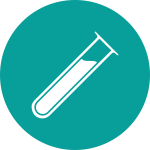Understanding Chronic Kidney Disease
Understanding Chronic Kidney DiseaseUnderstanding CKD Risk Factors
Your age, weight, family history, overall health—even your ethnicity—may put you at greater risk for CKD. If you have any of the risk factors described, be sure to talk to your doctor about your kidney health and get the screenings you need as soon as possible.
.png?h=112&iar=0&w=156&hash=1F8F5C750926CDAA81677A4B2BAAE43D)
1: Family history or background
- Someone in your family has kidney disease
- You are older than 50

2: Health issues
- Diabetes
- High blood pressure
- Cardiovascular disease
- Kidney or ureter blockages
- Obesity
- Lupus

3: Ethnicity
- You are of African American, Hispanic or Native American descent—certain ethnicities are more prone to diabetes and high blood pressure, which are risk factors for CKD

4: Lifestyle
- Overuse of medications with ibuprofen, naproxen or acetaminophen
- Chronic use of street drugs

How can I get screened?
Getting screened for chronic kidney disease just means being tested, and it’s an especially important step if you fall into one of the at-risk categories for CKD. You can be screened for CKD with two simple tests: a blood test and a urine sample test. Once you and your doctor know more about your current kidney health, you can make a plan to stay your healthiest—and keep an eye on your kidneys moving forward.
Early detection can make a difference
Need another reason to tune into your kidney health? The sooner your doctor can confirm a diagnosis for CKD, the earlier you can get started on a treatment plan that may help preserve kidney function and slow progression of damage. Put yourself first and don’t put off testing if you’re in an at-risk population.

Free kidney health class
Learn about the signs and symptoms of kidney disease and what you can expect. Take our free online class for educational tips and resources.
Start learning
“Don’t wait to get tested—it can save your life.”
Take the next step to early kidney disease detection.
Watch Sean’s story
